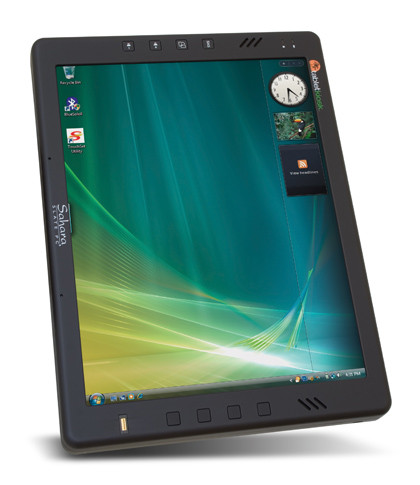Sign up for breaking news, reviews, opinion, top tech deals, and more.
You are now subscribed
Your newsletter sign-up was successful
5. Thin clients
It's an appealing idea: why buy a full-fat PC when you can buy a glorified screen and just hook into one? Put simply, because you probably want to do things on your PC. The cost of modern laptops makes the thin client largely pointless, although it depends to some extent on what you want to do.
Cloud computing means that a system that can access the web can potentially do everything you need. Nivio is the first to really throw out the PC and still let you use Windows. As for Microsoft, its big push into this market ended in 2004 with the cancellation of a project called Mira in favour of its subsequent interest in...
6. Tablet PCs
A combination of high expense, poor usability and general bad marketing torpedoed these Star Trek-style pads. While still using the Microsoft Origami moniker, they looked stylish, interesting and futuristic.
Once released as Windows Ultra Mobile PC, everyone lost interest. Uncomfortable controls on a slippery screen meant that the whole system only worked if you could twist the screen round to get a keyboard.

TOUCH REVOLUTION: Tablets and UMPCs are still sold and work well, but are awaiting their turn to shine
Sign up for breaking news, reviews, opinion, top tech deals, and more.
Instead of becoming a cheap internet platform, these expensive devices shot themselves right out of the market (except for a few niche cases). Like thin clients, however, they may be in for a resurgence now that both touchscreens and laptop technologies are getting cheaper.
7. Virtual money
Ecommerce is big business, but thankfully virtual currencies have died a death. Sites like Beenz and Flooz wanted us to put aside our boring old money in favour of stupidly named new ones.
They worked by either rewarding us in their fake-dollars for doing things like signing up to a website, or enabling us to order real products without needing to break out the Visa card.
The scheme made some sense in the days when everyone thought online shopping meant giving a million hackers access to your bank details, but that level of paranoia didn't last long. A number of companies still do very similar things, mind.
Wouldn't you rather buy something on your card than fill a virtual wallet with 2,000 Microsoft Points for an 800-point purchase? So would we. Hopefully, the nail in this coffin will be banged in good and hard soon.
8. Self-destructing DVDs
What could be more environmentally sound than a DVD that just stops working? DVD-D was intended to shake up the rental market, with discs containing a chemical that would stop them being readable after about 48 hours. DIVX (not the codec) was almost as silly.
Its discs didn't break, but locked you out after 48 hours unless you called a number to reactivate it. Thankfully for landfills everywhere, neither took off. Although piracy remains very popular.
9. Videophones
Here's a rare case where the technology is all there and ready. We can still videophone via Skype and most MSN clients if we want to, but it's become apparent that most people simply don't want to.
It's one thing to see a family member or lover who's on the other side of the world, but nobody wants to have to check their hair or remember to grab a towel if the phone rings while they're in the bath.
10. Smelly games
iSmell. The name says it all. Wouldn't you love to be able not only to explore new worlds, but smell them too? Answer: no. Not many games take place in flower shops and bakeries, but there are a lot of sewer levels out there. These are quite atmospheric enough, thank you very much.
Other attempts to make the gaming experience more realistic include chairs that punch you in the back, vests that do the same (using motors) and an arcade machine known as the Painstation, the original version of which would burn and flay your hand for losing a game of Pong. Call us wimps, but we'll pass.
And then there's SoftRAM...
SoftRAM was a revolutionary product – a software-based way of doubling your RAM that was released in 1995. There was just one problem: it was a scam. The software didn't work, to the point where the American FTC intervened and forced a recall. Still, if it had worked...
- 1
- 2
Current page: Thin clients, tablet PCs, virtual money
Prev Page Physics cards and new PC interfaces